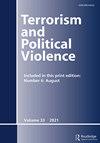接受暴力?受政治迫害的圈地中蓄意暴力后果的实验室实验
IF 2.1
2区 社会学
Q1 INTERNATIONAL RELATIONS
引用次数: 3
摘要
本文章由计算机程序翻译,如有差异,请以英文原文为准。
Accepting Violence? A Laboratory Experiment of the Violent Consequences of Deliberation in Politically Aggrieved Enclaves
ABSTRACT Do discussions in echo chambers break down barriers on the acceptance political violence? We know from research within political science, social psychology and communication that deliberation in echo chambers—called enclave deliberation—works as a driver for the amplification of existing political attitudes. Moreover, scholars of radicalization have argued that enclave deliberation can lead to extremist ideas and the acceptance of political violence in response to political grievances. Yet, amplification of attitudes, even into extremist ideas, is not the same as accepting violence. We still lack causal backing for the widespread claim that enclave deliberation fuels acceptance of political violence. Utilizing a novel laboratory experiment with 188 participants, this article delivers causal evidence suggesting that enclave deliberation increases politically aggrieved group members’ acceptance of violence. In addition, I find causal evidence supporting the claim that enclave deliberation amplifies existing political attitudes and makes group members’ opinions less diverse.
求助全文
通过发布文献求助,成功后即可免费获取论文全文。
去求助
来源期刊

Terrorism and Political Violence
Multiple-
CiteScore
5.60
自引率
8.30%
发文量
87
期刊介绍:
Terrorism and Political Violence advances scholarship on a broad range of issues associated with terrorism and political violence, including subjects such as: the political meaning of terrorist activity, violence by rebels and by states, the links between political violence and organized crime, protest, rebellion, revolution, the influence of social networks, and the impact on human rights. The journal draws upon many disciplines and theoretical perspectives as well as comparative approaches to provide some of the most groundbreaking work in a field that has hitherto lacked rigour. Terrorism and Political Violence features symposia and edited volumes to cover an important topic in depth. Subjects have included: terrorism and public policy; religion and violence; political parties and terrorism; technology and terrorism; and right-wing terrorism. The journal is essential reading for all academics, decision-makers, and security specialists concerned with understanding political violence.
 求助内容:
求助内容: 应助结果提醒方式:
应助结果提醒方式:


